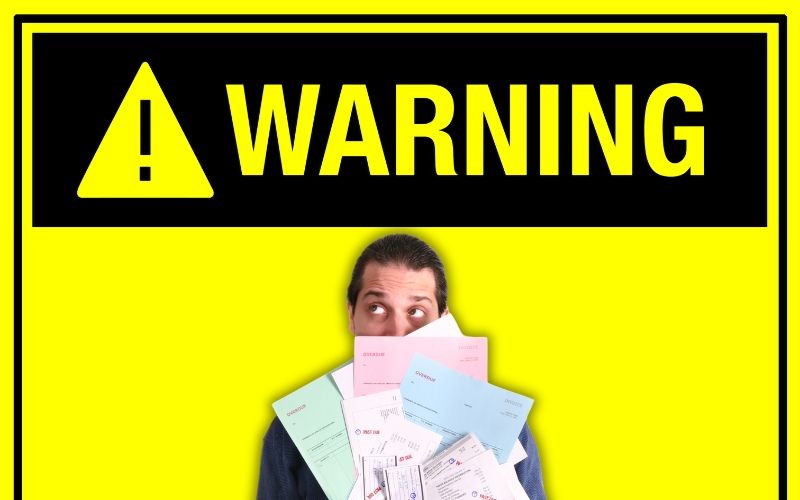Debt In A Marriage: What Are My Options?
Last Updated: October 18, 2023
Tips for Couples Dealing With Shared and Separate Debts

Marriage is supposed to be a beautiful thing, but sadly, so many newlyweds don’t know each other’s finances before tying the knot. If one spouse is entering the new courtship with a newfound debt from their partner, there are probably a lot of questions that need to be answered.
To help you understand the debt that comes from a partner after marriage and learn more about how to manage marriage and finances.
Is it Mine, Yours, or Ours?
Every state has its rules when it comes to who owns what debt. One of the first questions that newlyweds have when it comes to debt is: Who the heck is responsible for this debt?
The first thing that you need to look into is if your state is a community
property state. In a community property state, such as Arizona, Idaho, and more, the spouse may be liable for the debt upon marriage. However, in an on-community state, the spouse won’t be liable for any debt they didn’t sign up for. A quick search for your state laws can let you know where your state falls.
Combining Debts
Regardless of what your local state laws are, many couples often want to combine their debt to pay it down fast. If this is the route that you want to take, there are many options that you can take advantage of.
For instance, many credit card companies offer balance transfers for zero percent interest for a limited time period. This is a great way to combine your debts all under one account. If you’re going to take this route, just make sure that your balances aren’t too high, because if you don’t pay your bills off in time, you may be stuck with an interest rate that is higher than 20 percent.
If you don’t want to take the credit card route, consider talking with a reputable debt resolution company. A good debt resolution company will be accredited with the Consumer Debt Relief Initiative (CDRI), have at least an A BBB rating, and never charge you upfront fees. Generally, they will be able to save you around 50% on your original account balances, if not more. To learn more about how Pacific Debt can help, check out the details on our debt settlement program.
Lastly, if most of the debt is coming from student loans, look into various federal programs to help consolidate the loan. This is a route that should be taken if the student loans are in the tens of thousands.
Separating Finances
If you believe your spouse should pay for the debt they created, that’s fine. However, keep in mind that a successful relationship works on teamwork.
When going this route, it’s best to wait on a joint bank account or combine any other accounts until the debt is entirely paid off. Aside from the debt, also make sure that you put in your fair share of the bills that have to be paid every month, such as the utilities, rent, cable, and so forth.
Try to find that happy medium that works for your relationship. In the long run, debt is going to take time to pay off. As long as you work as a team, create a budget, and motivate yourself to pay off these debts, there’s no reason the debt will ruin the newfound marriage.
Communicate Openly About Debt
One of the most important things when dealing with debt in a marriage is to communicate openly and honestly about it. Set aside time to sit down together and go through all debts - yours, mine, and ours. List out all the debts, the amounts owed, interest rates, minimum payments, etc.
Having all the facts and figures in front of you allows you to see the full debt picture clearly. It also avoids any surprises down the road if new debts come to light that one spouse was not aware of.
Approach this conversation without judgment or blame. The goal is to work together as a team to tackle the debt, not point fingers at who is responsible. Make sure both spouses feel heard and understood.
Create a Joint Debt Repayment Plan
Now that everything is out in the open, you can start mapping out a joint plan of attack. Sit down and look at your combined incomes, expenses, and financial goals. What is realistic for you to put towards debt repayment each month? Are there areas where you can trim expenses and put those savings toward debt?
Prioritize paying down the debt with the highest interest rates first, as this will save you the most money in the long run. You may also consider consolidating multiple high-interest debts into one through a balance transfer credit card or debt consolidation loan.
Most importantly, make sure both spouses are on board with the plan and each knows what they are responsible for contributing. Review the plan together regularly and celebrate milestones like paying off credit cards or loans.
Get Professional Help

If you are feeling overwhelmed, don't hesitate to seek help from a financial advisor or nonprofit credit counseling agency. They can look at your full financial situation objectively and make tailored recommendations.
For example, they may suggest a debt management plan to lower interest rates and consolidate payments. For more severe debt, debt settlement or bankruptcy may be the most viable options.
Speaking to a third-party neutral professional can help provide clarity and often gives couples renewed motivation to work together towards financial freedom. Most nonprofits like NFCC member agencies offer free or low-cost services.
Have Ongoing Money Talks
- Schedule weekly or monthly "money dates" to go over finances, goals, and any concerns. This keeps communication regular.
- Discuss how you each were raised around money. Your money habits likely stem from your upbringing.
- Set short and long-term financial goals. Could be saving for a vacation, buying a house, or paying off student loans.
- If one spouse stays home with kids, discuss how this impacts your budget, retirement savings, and insurance needs.
- Talk through how you want to budget allowance for kids, teach financial literacy, and pay for college.
Consider Roles and Responsibilities
Discuss who will take the lead in handling bills, investments, taxes, and insurance policies. Split up what each spouse oversees. If one spouse earns more, talk about whether they should contribute more to joint expenses.
What feels fair?
Decide who will manage day-to-day spending vs long-term financial planning. Play to each person's strengths. Set guidelines on when you have to consult each other for purchases over a certain dollar amount. If needed, set up an allowance system for discretionary personal spending by each spouse.
Get Support From Family and Friends
Don't be ashamed to share challenges with close family/friends. They may be able to provide emotional support. If family members offer money, suggest putting it towards something specific like a debt payment vs handing over cash. Discuss and set boundaries around gifts from family, especially for kids' activities, education, and weddings.
Trade off childcare with other parent friends. This can save on daycare costs. Organize a monthly potluck to reduce dining out costs. Social support can help weather financial hardship.
FAQs
-
What if my spouse hid debt from me?
If you discover your partner was hiding debt or financial obligations from you, it's understandable to feel hurt or betrayed. However, avoid reacting in anger. Calmly communicate that you want full transparency moving forward. Offer forgiveness and work together on a repayment plan. Rebuilding trust takes time.
-
Should I bail my spouse out of debt?
It may be tempting to pay off your partner's debts yourself. But this can breed resentment, enable poor money habits to continue, and does not teach financial responsibility. Have an honest discussion and empower your spouse to take ownership. Offer support and accountability as they repay it.
-
What if our money values don't match?
Differences in money values like saving versus spending are common. The key is balance and compromise. Understand each other's perspectives and look for a middle ground. For example, set limits for discretionary spending while also saving for goals.
-
How do I protect my credit score?
Keep finances separate and do not become an authorized user on your spouse's credit cards if they have poor credit. Do not co-sign any loans. Check your own credit report regularly for inaccuracies or unknown accounts. Maintain good credit hygiene like paying bills on time.
-
Should I charge my spouse rent/board?
It is reasonable to expect your spouse to contribute if only one of you owns the home. But tread carefully as this can cause resentment. Consider having them pay towards a joint savings fund instead of "rent". And make sure you're ready for the commitment of a shared financial asset like a house.
Conclusion
Dealing with debt in a marriage can be challenging, but being open, communicative, and working as a team will help you weather the storm. The financial decisions you make together, even during difficult times, will end up strengthening your union and bringing you closer. There are always solutions available with a little creative thinking and practical strategies for overcoming debt stress.
Don't be afraid to also seek guidance from professionals, especially when navigating the complexities of the debt collection and legal process. In the end, if your relationship is grounded in love and mutual understanding, you will find a way to overcome debt or any other financial obstacles that come your way.
The key is maintaining compassion for one another and tackling issues side-by-side as partners. With teamwork and commitment, you will be able to relieve debt burdens and build a solid financial future as a married couple. Discover how to deal with financial stress effectively.
If you are struggling with overwhelming debt and want to explore your debt relief options, Pacific Debt Relief offers a
free consultation to assess your financial situation. Our debt specialists can provide objective guidance relevant information and support to help find the right debt relief solution.
Are you ready for debt relief help now?
Get Free Consultation- Accredited by Better Business Bureau with BBB A+ rating(4.93 rating and 1678 reviews)
- US News and World Reports and Bankrate ranked Pacific Debt Relief as one of “The Best Debt Relief Companies of 2024”
- 6.9 star rating by BestCompany.com (over 2379 client reviews)
- 4.8 star rating by TrustPilot based (over 1613 verified consumer reviews)
- ConsumerAffairs.com Accredited (over 544 verified reviews with an average rating of 5 stars)
- A Top 10 Rated Company by TopTenReviews.com , ConsumersAdvocate.com and Top10debtconsolidation.com
- 4.6 star rating by Google (229 client reviews)
- 100% rating by SuperMoney (9 client reviews)

Pacific Debt Relief
750 B Street Suite 1700
San Diego, CA 92101
Hours of Operation
Mon-Thurs: 6am - 7pm PST
Friday: 6am - 4:30pm PST
Saturday: 7:30am - 4:30pm PST
Clients
Phone: (877) 722-3328
Fax: (619) 238-6709
Email: cs@pacificdebt.com
Non-Clients
Phone: (833) 865-2028
Fax: (619) 238-6709
Email: inquiries@pacificdebt.com
"To eliminate debt one household at a time, while placing people first." - Pacific Debt
© 2024 Pacific Debt Inc. dba Pacific Debt Relief, all rights reserved.
California Privacy Policy |  Do Not Sell My Personal Information
Do Not Sell My Personal Information
GLBA Privacy Notice | CDRI Accredited Member
*We do not discriminate on the basis of race, color, religion, sex, marital status, national origin or ancestry.
*Please note that all calls with the company may be recorded or monitored for quality assurance and training purposes.
*Your visit to our website may be monitored and recorded from essential 3rd party scripts.
*Clients who make all their monthly program deposits pay approximately 50% of their enrolled balance before fees, or 65% to 85% including fees, over 24 to 48 months (some programs lengths can go higher). Not all clients are able to complete our program for various reasons, including their ability to save sufficient funds. Our estimates are based on prior results, which will vary depending on your specific circumstances. We do not guarantee that your debts will be resolved for a specific amount or percentage or within a specific period of time. We do not assume your debts, make monthly payments to creditors or provide tax, bankruptcy, accounting or legal advice or credit repair services. Pacific Debt is not a credit repair firm nor do we offer credit repair services. Our service is not available in all states and our fees may vary from state to state. Please contact a tax professional to discuss potential tax consequences of less than full balance debt resolution. Read and understand all program materials prior to enrollment. The use of debt settlement services will likely adversely affect your creditworthiness, may result in you being subject to collections or being sued by creditors or collectors and may increase the outstanding balances of your enrolled accounts due to the accrual of fees and interest. However, negotiated settlements we obtain on your behalf resolve the entire account, including all accrued fees and interest. C.P.D. Reg. No. T.S. 12-03825.









